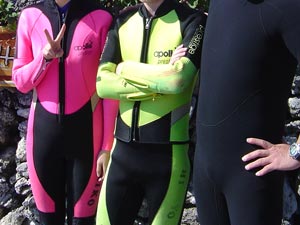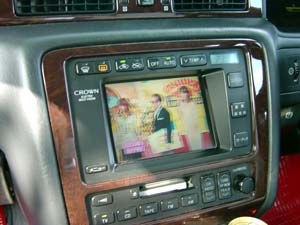a rubbish weekend
February 22, 2004
Well, I don’t know about you, but I just had a really shit weekend.
I was meant to be going for a 24 hour holiday with some of the other teachers to the next island, which I see every day but have never been to. We would have visited caves, climbed one of the small mountains, eaten good food, drunk some booze, and played cards and pool. It would have been fun, and I’d been looking forward to going for several weeks. However… at 6 o’clock on Saturday morning, I woke up ill with what, although it eventually turned out to be a stomach virus, I assumed (as I generally do with any illness that isn’t the common cold) was probably something terminal. By the mid-morning I’d recovered enough to leave the house in search of a doctor, and since I didn’t know whether my island’s doctor speaks English (and I couldn’t face trying to explain in Japanese and mime), I made a dash for the plane to get to the big city. The plane, though, was full, which meant that I had to spend three hours travelling by boat, taxi, and bus, to get to a hospital that I knew had English-speaking doctors. I was told it was probably a virus, given powders to swallow, and told to come back in a week if I wasn’t better.
So, having left the hospital, I went back to a town near my port to look for a hotel, since by this time it was evening, and the last ferry to my island leaves mid-afternoon. I could have called another English teacher, but it was already 9ish, and I wanted to find somewhere where I could just curl up and groan myself to sleep. The rain was getting harder, and so I ran back to a grotty-looking hotel that I’d walked past a few minutes before. It turned out, after I’d paid for a night (the lobby didn’t look that bad…) to be the worst hotel I’ve ever stayed in. By which I don’t mean “the claret was at the wrong temperature and the waiter was rude”. No, what I mean is “the once-red carpet had long-since turned black, where it had not been entirely worn away, and the walls of my room were not just damp-stained, but looked like someone had actually thrown some kind of brown fluid, from a bucket, at them.” In fact, there was one particular splash-shaped stain on the wall with an unstained shadow in the middle, which looked exactly as if someone had thrown a bucket of dirty water at a startled cat.
But the hotel was not just grotty. Oh no! It was weird as well. When I ran out at night to get a bottle of mineral water from a convenience store (since even if I had trusted the hotel’s water, I wouldn’t have wanted to drink it from the thirty-year-old cracked blue plastic cup in my room), the man at the reception desk struck up a conversation with me. So, I was a teacher, right? Yes, I said. On 無名 Island, right? Yes, that’s right (I’d filled in my address when I checked in). So, I’m American, right? No, British. Oh, British – is that so? Yes. So, and in Britain did I teach English? No. I didn’t. I did teach a little bit, but it was psychology, not English. Aha! Is that so? And I’m definitely British, am I? I’m definitely not American? No, British. Ah, is that so, is that so?
At this point, as he was saying “Is that so? Is that so?”, the man jotted something down on a scrap of paper in front of him, and put a ring round it, and I suddenly realised that there was something deeply, profoundly wrong with the conversation I was having, that there was something going on that I didn’t understand, and that I really didn’t want to talk any more about who I was, what I did, or where I was from. It’s very difficult to explain precisely what was wrong – none of the questions he asked me were particularly unreasonable – but just as the inflection and timing of what someone is saying can tell you all sorts of things – that they are using a computer as they’re talking to you, or skim-reading a newspaper, or that they don’t believe a word you’re saying, or that they find you unnervingly attractive – that wouldn’t be perceptible to someone reading a written transcription of the words spoken, there was something about this superficially normal conversation that was not normal. He was seeing relationships between my answers that I couldn’t see. There was something going on.
It occurred to me afterwards that the conversation had focussed on things like what sports are popular in Britain? and American and British English are quite different, are they not? After I walked off, I realised that actually everything we’d just been talking about was about the differences between Britain and America – in other words, exactly the kind of topics of conversation you would choose if you were trying to trick an American who claimed to be British into making some slip that would reveal his true nationality. Of course, they’re also things you might ask about if you were a Japanese person interested in the differences between Britain and America. But this man wasn’t. He was up to something.
So that was my weekend. Here are the statistics:
- time spent travelling to/from hospital: 6 hours
- time in hospital: 2 hours
- total cost of travel, medicine, accommodation: 15,000yen approx. (= £74 at current exch. rate)
- how much it would have cost to go on holiday to the next island: 8,500yen approx. (= £42 at current exch. rate)
Oh, yes. I forgot to say that having checked in to my hotel, I felt I should eat something, so I went out to look for a restaurant. About 200m down the road, it started to absolutely piss it down. I got soaked to the skin.


